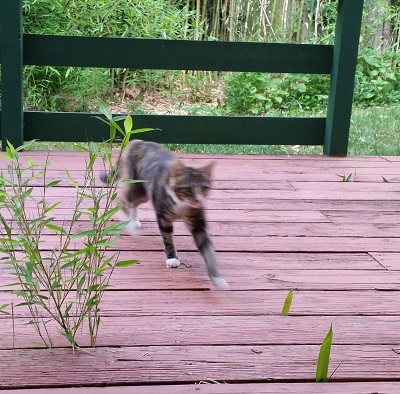What you do for yourself, you’re doing for others, and what you do for others, you’re doing for yourself.
– Pema Chödrön, Comfortable with Uncertainty
 Bamboo lurks in my backyard, running its rhizomes greedily into the very foundation of my home. It is welcome to live its linear life, just not to undermine mine. I hack and hack at its roots.
Bamboo lurks in my backyard, running its rhizomes greedily into the very foundation of my home. It is welcome to live its linear life, just not to undermine mine. I hack and hack at its roots.
I am hacking at the roots of my self-loathing. The roots are deep, damply, insidiously interwoven.
I have on-going conversations in my head. I talk to and with myself, others in my present, others from my past, people and beings (cats and a dog) living and dead, and the blank writer’s page.
Some of my conversations are what is termed self-talk, what I say to myself about myself.
In counseling sessions with Dr. H., I’ve talked endlessly about the whys of addiction but not about the ending of my second marriage. Dr. H. told me no one is “exempt from the extended low” that comes from the finality of the end of a marriage, no matter how long the husband and wife have been separated. As my marriage approaches its formal close, Dr. H. suggested I might want to jot down what comes up for me and bring those notes into our next session. What, feel feelings instead of talk about thoughts?!
In some programs of addictions recovery, we’re asked to inventory our feelings, thoughts and behaviors, and to make lists of incidents and events in our lives that continue to trouble, even plague us, ones we did or ones done to us. We’re asked to look at our part in what happened, or our part in how we have handled what happened.
I inventoried my marriage. I wrote, “My standards and expectations and demands were unceasing.”
What must it have been like to live with me?
I am so sorry, my husband.
. . . . .
I know what it is like to live with someone who constantly analyzes, constantly evaluates, constantly judges and speaks endless words to me of how I am lacking, falling short, flawed at the very deepest levels, in need of correction, reprimand, scolding, who points out incessantly what I could do differently and better. Shame on me for being that way and for doing that thing.
That voice and those words are mine. I live with me and my negative self-talk, the dark and twisted words that grow from the roots of my self-loathing.
In spite of how much I might love, appreciate and value someone else, if my self-talk, my daily word practice, is full of demands, criticisms and condemnations, I train myself daily in personal fault-finding. How could that negative perspective not run its roots into my words and actions with others, even with my most beloved?
“What we need for the building of a self is also precisely what we need for happiness in our adult relationships.”
– David Richo
Richo writes, “We feel loved when we receive attention, acceptance, appreciation, and affection, and when we are allowed the freedom to live in accord with our own deepest needs and wishes.”
Is this what I’m to grow then, tall and fast and deep as bamboo, a new self-talk, a new daily word practice: self-attention, self-acceptance, self-appreciation, self-affection, self-allowing?
The self-loathing uses its roots as lashes against those words of self-love.
A friend suggested a journal exercise with this question: “If you would listen to it, what would your intuition tell you right now?”
“You want to love your life,” my intuition answered.
I have to grow.

